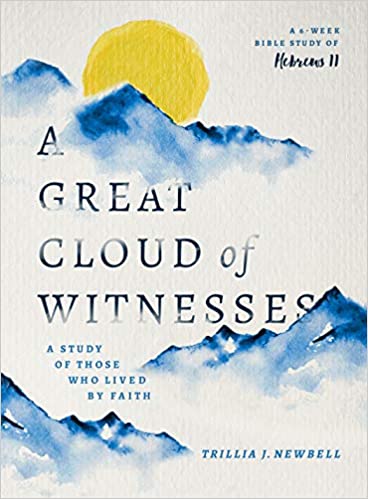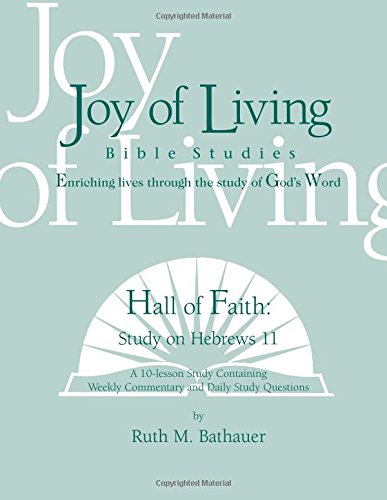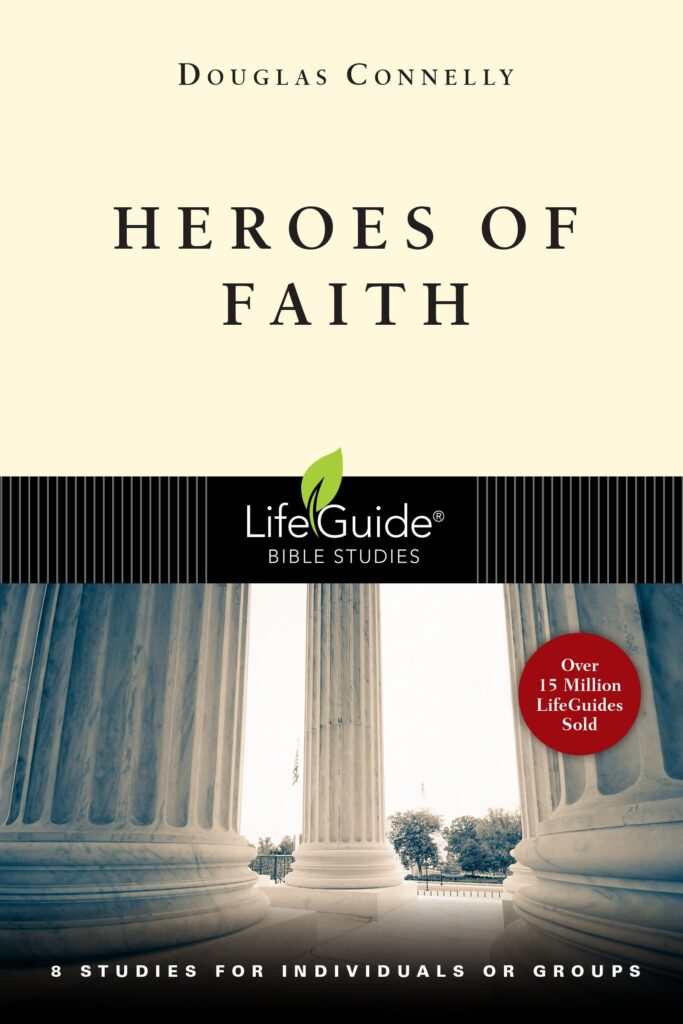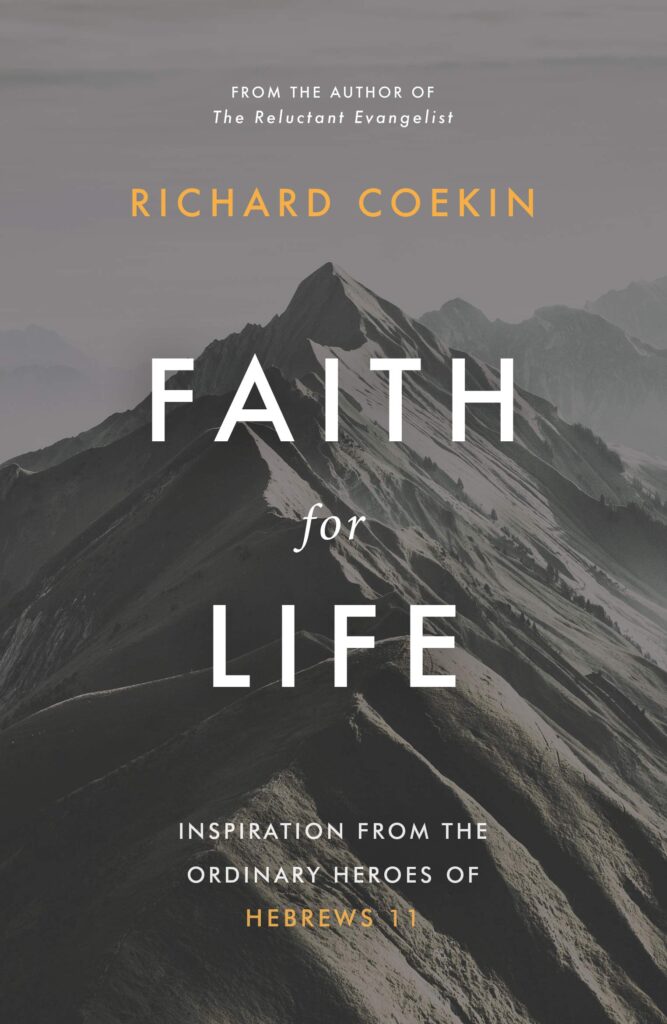Click here to return to Blog Post Intro
A Great Cloud of Witnesses: A Study of Those Who Lived by Faith by Trillia Newbell

Abraham lived a life of unknowns. First, in Genesis 12, Abram was called by God to leave Haran and go to Canaan (verses 1-4). He was called away from everything he held dear, including his land and parts of his family, to go to a foreign land. What’s more is that God speaks of people who might dishonor him (v. 3). Abraham went—immediately.
Abraham doesn’t place his faith in his abilities, wisdom, or strength. His faith is in the God who called him. Abraham obeyed “not knowing where he was going,” but he knew the One who was sending him (Hebrews 11:8). God had promised Abraham that He’d be with him and that Abraham would receive an inheritance (Genesis 12:2-3). He believed God was a promise keeper.
God was faithful to Abraham time and time again. So, there’s a possibility that by the time we get to Isaac’s potential sacrifice, Abraham could look back over his life and walk in faith as a result. Abraham’s faith is convicting!
How might remembering what the Lord did in other situations in the past help us as we face the future? Let’s be encouraged to ask the Lord for grace to imitate Abraham’s faith (1 Corinthians 11:1).
Unlikely Heroes: Ordinary People with Extraordinary Faith by Daniel Lockwood

Abraham: The Unlikely Adventurer
Living by faith is a journey. Let’s consider Abraham’s journal entries along the way:
Journal Entry #1: Believing God’s Word
According to Hebrews 11:8, “By faith, Abraham obeyed when he was called to go to a place that he was to receive as an inheritance.” Like Abraham, we need to design and embrace a strategy for knowing, believing, and obeying the revelation of God. That strategy must include involvement in a thriving local church and attendance at the weekly service. We also need regular, personal nourishment from God’s Word.
So, “Abram went”—two of the boldest words in all literature that signal complete departure from everything that has gone before in the long evolution of culture and sensibility, according to Thomas Cahill’s view of Abraham’s story in his book The Gift of the Jews.
Journal Entry #2: One Stage at a Time
The phrase in Hebrews 11:8 continues, “And he went out, not knowing where he was going.” This adventurer is given marching orders with no specific destination. The life of faith is progressive. God does not all at once tell Abraham everything he will eventually need to know. He only reveals what is necessary for Abraham to take the first step to leave Ur.
Do you sometimes impatiently ask, “Lord, if you’ll just tell me what to do, I’ll gladly do it?” Remember Abraham. Then practice the biblical truths you know and thank God he holds your destiny in his loving hand and gives you the strength for each leg of the journey.
Brady’s Story
I really relate to God’s calling on my own life “one stage at a time.” When I was in the ninth grade, I served as editor of our Junior High yearbook. It was a special one because we spent 9 years together in school, and many of us were going separate ways in High School. My English teacher was our sponsor, and she told me, “You ought to run for President when you get older.” Since I had so much respect for her, I prayed for God’s direction, and He made it very clear that I should seek a career in the public service.
But, that can mean a lot of things… When I was choosing a university, I was pleased to learn that Texas A&M University (where my brother, Blake, played baseball) offered Cooperative Education opportunities to non-engineering students. I was determined to gain work experience at the local, state, and federal government levels to further discern the calling.
Following my High School graduation, I worked as a summer intern for the City of Corpus Christi’s Accounting Department. While I enjoyed working with the people, that job was not the right fit for me. In college, I studied Political Science with a particular focus on Public Administration.
My sophomore year, I started investigating Cooperative Education opportunities. I was excited to interview with the CIA, but they weren’t interested since I did not have a particular foreign language focus. Then, there was an opportunity to work in Washington, D.C. with the Department of Health & Human Services’ Assistant Secretary for Personnel Administration. I had a great interview, but they said they normally hire graduate students. They said if I worked in their Regional Personnel Office in Dallas first, we could determine whether or not to pursue the opportunity in D.C.
That’s when I had my first experience in Human Resources. HHS Dallas Regional Personnel Office is where I first learned the different disciplines of Federal HR (as a GS-3!): staffing, classification, and employee relations. I enjoyed my experience, and they were pleased to offer me the opportunity to come to D.C. as a GS-4; and my peers were all graduate students there. The D.C. experience was focused on policy work, and I learned I was more interested in HR operations.
In school, I took my first HR Management class from Blaine McCormick, who became a great mentor and friend. Then, I worked in the City of Corpus Christi’s Human Resources Department. I knew I found my profession!
I continued to study and learn about human resources and found that many organizations had “HR Generalists.” I pursued a Master’s Degree in HR Management–also from Texas A&M–and continued to refine my focus. For one of my classes, I conducted a study of Federal HR Offices in Texas, learning which offered HR generalist roles. As part of the study, I visited NASA’s Johnson Space Center and found they had the type of role I was seeking. When I asked how I could become part of the team, they offered me a Graduate Co-op role. That was in 1995. I’ve continued to receive a variety of unique opportunities from NASA (as depicted in my bio). Today, I serve as the Deputy Chief Human Capital Officer for NASA–probably the only such person who works outside of Washington, D.C. since we still live in Houston, Texas.
My professional journey has certainly been a “one stage at a time” journey. God has provided just enough guidance and clarity to take that next step, and I’m curious what He has in store for the next several years!
Abraham: The Unlikely Worshipper
Three events in Abraham’s life in Canaan are spiritual high points:
- Abraham receives God’s call from Haran in the first giving of the Abrahamic covenant (Genesis 12:1-3). The covenant is renewed and expanded at least four times in his lifetime (Genesis 13; 15; 17; and 22).
- God supernaturally renews this unconditional covenant (Genesis 15).
- God, preparing to destroy Sodom and Gomorrah, visits with his friend Abraham and shares a meal (Genesis 18); and God blesses both Abraham and Sarah as heirs of the promise.
Journal Entry #3: Failure
Abraham’s first failure follows on the heels of God’s giving of the Abrahamic covenant. He makes an unrighteous choice in Egypt. Abraham is married to a beautiful woman, Sarah. Fearing Egypt’s monarch will seize her for his harem—perhaps at the cost of Abraham’s life—Abraham crafts the story that Sarah is his sister. After God sends plagues to Egypt, the angry Egyptian king returns Sarah to her husband and sends both of them packing. No matter how you nuance it, Abraham blows it big time.
Later, Abraham takes another wrong turn regarding Sarah’s handmaid. At Sarah’s urging, he takes Hagar to be his second wife and bears a son, Ishmael. Red flags are all over the place: Hagar’s arrogant disdain, Sarah’s jealousy, Abraham’s insensitivity, the violation of monogamy, and the historical record of long-lasting enmity between the descendants of Abraham’s two sons. Above all, Abraham’s actions contradict God’s declaration that the son of promise would be a descendant of Abraham and Sarah, not Hagar.
A third failure occurs when Abraham lies to King Abimelech—this time at the age of 99 with his 89 year-old wife—resurrecting his old story that he and Sarah are brother and sister. Like Pharaoah, Abimelech seized Sarah as his wife and God intervened. The Lord closed the wombs of Abimelech’s household and in a dream warned Abimelech of imminent death if he did not return Sarah to Abraham. Abraham rationalized his story when he told Abimelech, “She really is my half-sister after all!” Abraham’s self-centeredness in jeopardizing Sarah’s integrity for his own protection shocks us with its brazenness.
How can we learn from Abraham’s failures? First, recognize the temptation to sin often follows spiritual success. Second, sin always has consequences which can lead to further sin. Third, sin easily becomes habitual.
It’s important for us to recognize that the journey of faith may involve failure. We can be men and women of faith despite sin and failure.
Journal Entry #4: Barren Times
Consider these key points in Abraham’s life:
- 75 years old: Abraham leaves home and travels to Canaan
- 86 years old: Abraham has a son, Ishmael, with Sarah’s handmaid, Hagar
- 100 years old: Abraham and Sarah have their son, Isaac
- 175 years old: Abraham dies
Did you notice that it was 11 years of barrenness for Abraham and Sarah after they left their home with God’s promise? And 13 more years of barrenness following the birth of Ishmael? It would have been easy for Abraham to think, “Has God abandoned me?”
Journal Entry #5: Longing for an Eternal Home
Two words describe Abraham: wanderer and worshipper. Wherever he journeys, he pitches a tent and builds an altar.
Where is our citizenship? Do we seek the eternal city? An eternal perspective affects the way we think.
Five Applications for the Journey of Faith from Abraham
- Faith begins with God’s Word: Know the Book!
- Faith is progressive: Be patient!
- Faith may involve failure: Repent and endure!
- Faith passes through the desert: Stay the course!
- Faith longs for home: Look toward heaven!
Abraham: The Unlikely Believer
The Test
When Abraham is 120 years old—and Isaac is nearly 20—God tells Abraham, “Take your son, and offer him as a burnt offering on a mountain I’ll show you when you’re on your way. It’s your only true son by Sarah, your miracle boy, the son you dearly love, the child of promise. It’s Isaac. Do it now!”
God’s test of Abraham is not discovery but confirmation; its effects are less for God than they are for Abraham (and us!). This conforms to the New Testament purpose of testing, where tests and trials are means to refine and perfect our faith (James 1:2-4, 12).
How does Abraham respond? He rises early the next morning, assembles his company and caravan, and is on his way.
Abraham fully intends to kill his son, yet his faith in a sovereign, righteous, truthful, and faithful Creator stands firm. He brings down his arm, but God stops him in the nick of time, providing a lamb for the sacrifice. Then, God offers loving affirmation, “Now I know that you love me.” Abraham knows this in a startling new and deepened way too.
Abraham is thoroughly tested by God, and this “friend of God” passes with flying colors. He seems every bit a man with unlikely, almost unbelievable faith.
Joy of Living Bible Studies – Hall of Faith: Study on Hebrews 11 by Ruth M. Bathauer

Consider James 2:20-24, “You foolish person, do you want evidence that faith without deeds is useless? Was not our father Abraham considered righteous for what he did when he offered his son Isaac on the altar? You see that his faith and his actions were working together, and his faith was made complete by what he did. And the scripture was fulfilled that says, “Abraham believed God, and it was credited to him as righteousness,” and he was called God’s friend. You see that a person is considered righteous by what they do and not by faith alone.
Let’s look closer at Abraham’s call. Joshua 24:2 tells us that his father, Terah, “worshipped other gods.” Put yourself in Abraham’s situation. He was living in a progressive, comfortable metropolis when he received a command from God, who was not even acknowledged by his family or by most people who lived in his hometown.
What did Abraham do? He took God at his word and obeyed.
Abraham’s call from God was unique in that Abraham’s call affected all mankind. God promised that through Abraham’s faithfulness “all peoples on earth will be blessed” through him (Genesis 12:3).
We need to realize that faith for Abraham was a step-by-step experience as he went from one incident to another and learned to trust God more fully with each step (Hebrews 11:8-10). Abraham and his family lived in Canaan like strangers in a foreign land, and he had the patience to wait upon God to make the land available. Abraham lived by faith in God and in His promises.
Take God at His word and claim His promises.

When the late Dr. Henrietta Myers was asked what she would change in her life if given the opportunity, she replied, “I would trust God more and believe His promises more fully.” Beginning today, we have that opportunity. Believe God and make His promises your own.
Heroes of Faith by Douglas Connelly

Believing the Impossible
Abraham’s journey of faith began when God appeared to him in the city of Ur and called him to leave his home and follow God to a new land (Genesis 12:1-4). Then, after he reached the promised land of Canaan, Abraham lived as a stranger and foreigner there with no permanent residence (Hebrews 11:9). His faith was further challenged by Sarah’s inability to conceive. Yet in all these situations—over 25 years of time—Abraham continued to believe that God would fulfill his promise to give Abraham and Sarah children and that their descendants would possess the land of Canaan.
We may be tempted to give up on a life dream or a call from God or a spiritual desire if it takes too long to become a reality. That’s when the story of Abraham brings renewed encouragement to us to keep trusting God. It’s worth noting, however, that even Abraham struggled with God’s promise as the years passed.
Abraham believed God would keep his promises completely. He didn’t live long enough to see it all happen, but they embraced the fulness of God’s promises by faith. The same can be true in our lives. We may not live to see the work of God come to completion in our children or our friends or our church. What we can do is trust that God will do what He says He will do.

Faith for Life: Inspiration from the Ordinary Heroes of Hebrews 11 by Richard Coekin

Obedient
The call of Abraham to “leave your country and your people and go to the land I will show you” is similar to Jesus’ call on the disciples to “follow me.” As Peter tells Jesus, “We have left everything to follow you.” Jesus clearly taught that to be His follower we must make him our primary commitment.
God calls us—like Abraham—to embrace a new identity as His people, no longer defined by this world’s ideas of geography and race.
Like Jesus Christ, Abraham didn’t mind living differently because he was challenging the worldly culture around him and being compellingly distinctive to anyone interested in eternity. The faith of Abraham reminds us to remain strangers to this world and its values.
In imitating three aspects of Abraham’s faith—obeying God by leaving for a future country; waiting for God’s future city; and trusting God for a future child—we too can persevere for an unseen future, by obedient faith in God’s word.
Sacrificial
As Hebrews 11:7 put it, “By faith Abraham, when God tested him, offered Isaac as a sacrifice.” We are told in the account what Abraham was not told—that this was not a command to commit murder but a test to strengthen Abraham’s faith. For while Satan tests (tempts) our faith in God’s word, hoping to get us to abandon it, the Lord only tests (trains) our faith to strengthen it, like an athlete stressing a muscle group.
When Abraham heard God’s call, he responded with the submissive words of Samuel, David, Isaiah, and Jesus, “Here I am” (Hebrews 10:7; Genesis 22:1).
This was a rehearsal for the sacrifice of Jesus. Mount Moriah was actually the very hill on which Jerusalem and the temple would later be built and where Jesus would be sacrificed for our sins.
When Jesus calls us to deny ourselves, take up our cross and follow him, there may be great personal costs involved. Dietrich Bonhoeffer, the German pastor imprisoned and finally executed for his opposition to Hitler and Nazism, wrote about this from prison in letters collected together and published as The Cost of Discipleship. He wrote, “The cross is laid on every Christian. When Christ calls a man, he bids him come and die… Suffering then, is the badge of true discipleship. The disciple is not above his master… That is why Luther reckoned suffering among the marks of the true church… If we refuse to take up our cross and submit to suffering and rejection at the hands of men, we forfeit our fellowship with Christ and have ceased to follow Him.”
God’s Hall of Faith Speaks Today (Hebrews 11) by J. David Eshleman

When God called, Abraham responded immediately. Delayed obedience is not obedience. Abram, in addition to accepting the promise that his descendants would inherit the land, looked forward to eternity, “for he was looking forward to the city with foundations, whose architect and builder is God” (Hebrews 11:10-11). Abraham had a long-range view.
Unfortunately, he stumbled along the way too. A history of great pain and suffering which we are still feeling today resulted from Abraham’s decision to have a child by Hagar. The Jews and Arabs were not always fighting each other.
God made a covenant with Abram (Genesis 17). He changed his name from Abram (exalted father) to Abraham (the father of many nations).
When God asked Abraham to sacrifice Isaac, God intervened to save Isaac’s life. There are many times God intervenes to save us from harm and death; however other times we must trust him even though he allows us to take the path of suffering and martyrdom. James was martyred, but Peter walked out of prison the next morning a free man (Acts 12). We are not promised deliverance from pain and suffering, but we are promised he will never forsake us. The disciples died a martyr’s death.
Abraham is the only person in the Old Testament who is called a friend of God (Isaiah 41:8; 2 Chronicles 20:7). Jesus said, “You are my friends if you do what I command” (John 15:14). Is Jesus your friend? If you walk in faith, abiding in Jesus as the branch abides in the vine, you are his friend.
Some People Know Him Not
Some know about him
Some know him as Savior
Some know him as Lord
Some know him as Father
Very few know him as a Friend.

